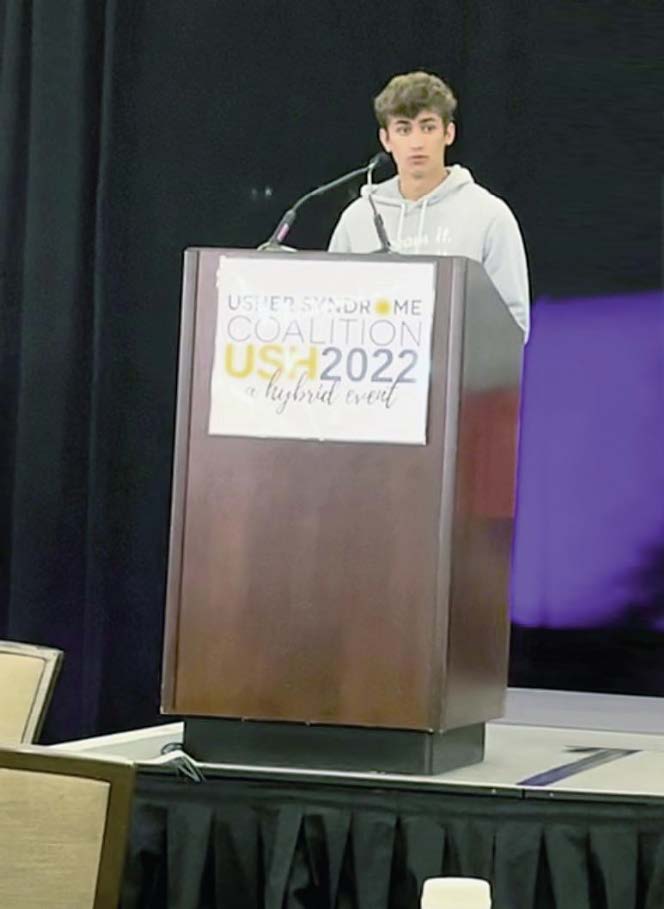When socializing, I often miss subtle social cues. Facial expressions and body language often fly right over my head. Localizing sound is another challenge entirely. Even if I know the general source (a person talking, a plane overhead, a car approaching), I really don't know exactly where the sound is coming from, and it takes a minute to search for clues to figure it out. I may just have to ask someone. These seemingly minor things add up, creating a daily battle with fatigue. My eyes strain. I get headaches from the exhaustion, both physical and mental. This is why speaking up for the accommodations I need is crucial. They help make things a little easier, so I feel less tired and have more energy at the end of the day. The struggle to be believed and convince others that I am not lazy can be frustrating. Teachers have even suggested I cut back on extracurriculars if fatigue is such an issue. Is that fair? Should I have to choose between activites I enjoy and managing my disability?
FINDING MY VOICE
Being vulnerable and finding the courage to put yourself out there can be difficult for anyone. When you need help navigating the real world, it is important to speak up to advocate for yourself, even if it is difficult. Finding my voice was so important as I was growing up. I was once asked if advocacy came naturally to me and my answer was yes, but not because it was some magical, innate ability. I learned from my parents. They were the ones initially talking to the teachers about the accommodations that would provide me with the best learning environment and create a level playing field for me. They started the journey of advocacy which enabled me to find my voice, because they included me. I basically practiced it my entire life, because it was a part of everything from the start. Since accommodations are often misunderstood, I learned how to explain that it is not about making things easier, it is about providing equal opportunity for success.
Advocating for myself became second nature, because it was a skill honed throughout my life. From a very young age, my parents always kept me informed about their conversations with teachers, explaining why I needed these supports to lessen the struggle, even when I resisted. My mother included me in the emails that she sent teachers at the beginning of each year, so I would become familiar with the language. As I got older, I was included more and more in these conversations, and I often ended up handling the discussion, because the teachers really wanted to hear directly from me. This led naturally to me leading the conversations in meetings, writing the emails with the support of my parents, and eventually transi tioning to doing it all independently by the time I reached college. However, it is a continuous learning process, and I am still learning new things to improve my advocacy skills. I am 19 years old and though the journey has been far from smooth, I am determined to persevere and keep refining my voice, as strong advocacy opens doors and creates a more inclusive world for everyone. I am grateful for the foundation my parents built, and I'm excited to see where this path of self-advocacy takes me next.
BUILDING CONFIDENCE IN USING MY VOICE
I know my voice is only powerful if I use it, and some might think that since I know how to speak up for myself, I am ready for anything. Right? Wrong! It is easier said than done to speak up for yourself in a vulnerable situation and have that spotlight shine on you. That is where one of the principles I was raised with comes into play. Confidence! A quality, I recognize now, that my parents relentlessly instilled in me and my brother. Talking about having Usher syndrome and spreading awareness became a springboard for building confidence. Public speaking became part of our lives, whether it was a presentation for my classmates, professional development for teachers, a speech for a charity event or a fundraiser, being part of a student panel at a family event, or for lecturing a university class.

SPEAK NOW: The author introducing a speaker at the USH2022 conference in Austin, TX; "Since accommodations are often misunderstood, I learned how to explain that it is not about making things easier, it is about providing equal opportunity for success."